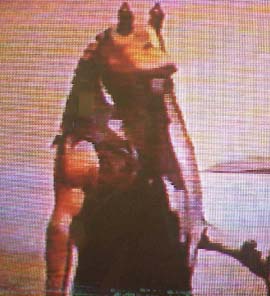|
Phantoms menace 'Star Wars'
|
 |
May 28, 1999: 7:37 p.m. ET
Bootleggers sell video copies of hit film as industry tries to strike back
|
NEW YORK (CNNfn) - The man in the Billy Joel T-shirt stands among the street peddlers in Herald Square Friday and shouts to the afternoon crowd.
"We got 'Star Wars,' " he yells, holding up a videocassette. " 'Phantom Menace' right here, only five dollars."
The transaction is fast. Nimble fingers quickly snatch greenbacks and the street corner consumer gets a video knock-off of the hottest movie of the moment for five bucks -- wrapped in an "I love New York" bag. Then on to the next customer.

Scene from bootleg "Phantom Menace" tape
At first glance, it looks like the buyer got a pretty good deal.
The bootleg cassette comes in box with a picture of the "Phantom Menace" characters and the LucasFilm studio logo on the bottom.
But, on closer inspection the picture actually turns out to be a reprint of the film's poster, and not a very sharp picture at that.
The label is even more interesting. The black and white sticker sports a New Line Cinema logo and copyright, even though the George Lucas film is being distributed by News Corp.'s (NWS) Twentieth-Century Fox.
And, in an ironic twist, the label also bears the FBI anti-piracy warning that promises "severe civil and criminal penalties" for the very thing you hold in your hands.
So much for the $5 bargain.

Label from bootleg 'Star Wars' video
As with most bootleg videos, the visual quality of the tape is poor, with dimly lit scenes and hollow sound. But there they are: Qui-Gon Jinn, Yoda, and Darth Maul, all running across your TV screen for less than the cost of a movie ticket.
The tagline for the box office smash "Star Wars: Episode I: The Phantom Menace" may be "Every saga has a beginning," but the menace of film piracy seems to have no end.
In fact, it's growing.
The Motion Picture Association of America estimates that pirated films cost the industry $250 million a year in lost revenues in the United States alone and over $2 billion throughout the world. Asia and Russia are two of the larger piracy hotspots outside of the country.
"It's a big problem," said Dave Dolson, the MPAA's senior staff supervisor for U.S. antipiracy operations. "Every movie that comes out, we find it pirated. 'Phantom Menace' is the hot button movie today, but last year it was 'Titanic.' It's hard to stop."
Technology makes it easier
"I think it's gotten worse," said Tom Sherak, chairman of News Corp.'s Twentieth-Century Fox Domestic Film Group. "As the technology has gotten better and better, the problem is getting worse and worse. What happens when the quality gets better? That's a really big concern."
LucasFilm Ltd. president Gordon Radley said in a statement that film piracy not only hurts studios, investors and creative talent, but the nation's economy as well, since "the products of our entertainment industry are one of the largest exports of the United States."
Dolson said pirates often use intricate methods to disguise their illegal activities. Some conceal a video camera in a backpack, place it on a theater seat and then sit a few rows away for the "hands off" approach.
Others get dishonest theater employees to let them come in late at night for a private taping. After that, it's back to the lab to copy, copy, copy.
In Wisconsin, an actual copy of the film was stolen from a movie theater, sparking fears the reels would make their way to the black market where higher quality tapes could be sold all over the world. However, the film was recovered a few days later when two men turned themselves in to police.
New York is a hot spot
The Big Apple is a hot spot for the pirate film business and the MPAA is putting a lot of effort into cleaning up the town.
"There are labs in New York furnishing cassettes to the entire United States," Dolson said. "We've found shipments of cassettes in downtown L.A. that came from New York."

Jar Jar Binks can't escape film pirates
Dolson said the MPAA has a anti-piracy team in New York that is staffed by a number of retired New York cops. Southern California has its another squad, also made up of retired area police officers, to handle West Coast activity.
The association also has a hotline -- 1-800-NOCOPYS -- set up to handle tips on film bootleggers and offers rewards for convictions.
"We constantly chase leads and develop our own," Dolson said. "We have our own surveillance and we have put people in L.A. and in New York in prison."
The MPAA also will pursue civil cases against bootleggers, going after their assets to put them out of commission.
But with all that, seemingly honest, ordinary citizens are still out there on the street corner, handing over their money to criminals.
"It's like anything else," said Sherak of Twentieth Century Fox. "If people stopped buying them, the (bootleggers) would stop selling them." 
-- by staff writer Rob Lenihan
|
|
|
|
|
 |

|

